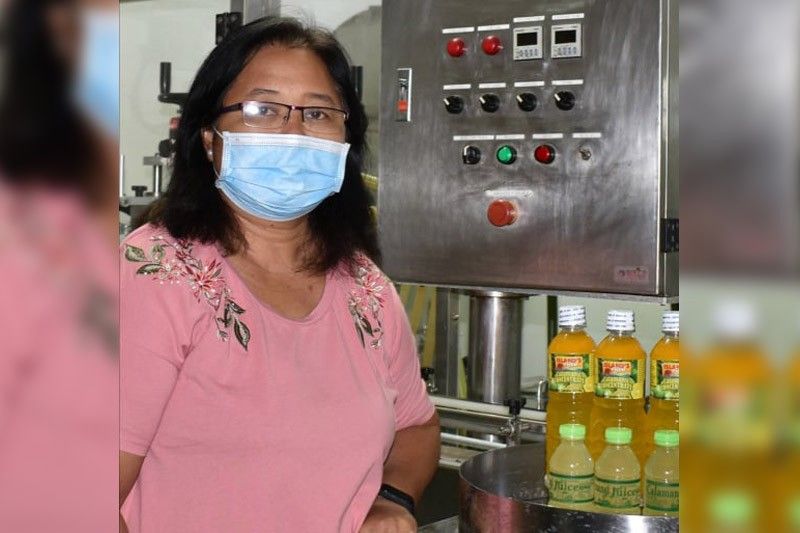Microentrepreneurs get the support they need to restart and rebuild their businesses in the face of a global pandemic

MANILA, Philippines — When the COVID-19 pandemic started in 2020, many local businesses were caught by surprise. No one was prepared for the shutdown of non-essential businesses for months, and as the quarantine extended, it became harder and harder for many businesses to bounce back even as restrictions eased.
As a result of this, some microenterprises faced the possibility of permanently closing down their physical stores and production sites, which would have meant loss of income not only for the microentrepreneurs themselves but also for their employees.
In the face of these challenges, the Citi Microentrepreneurship Awards (CMA), which has recognized the achievements of hundreds of Filipino entrepreneurs since 2002, saw the need to assist microenterprises during this difficult time.
In 2020, as a response to the challenges brought by the pandemic, CMA included two components in the annual awards program: the granting of the COVID-19 microenterprise support package for the rehabilitation needs of previous winners; and the recognition of outstanding microentrepreneurs for their contribution to rebuilding local economies hit by the pandemic.
The CMA program is a signature initiative of the Citi Foundation and highlights the efforts of partners like the Bangko Sentral ng Pilipinas (BSP), Citi Philippines, and the Microfinance Council of the Philippines Inc. (MCPI) to strengthen microfinance and enterprise development and financial inclusion in the country.
'It was a lifesaver'
Seventy-four of the CMA’s past winners from 2002 to 2019, whose businesses were severely affected by the pandemic, received financial assistance worth up to P50,000, plus access to recovery planning sessions as part of the CMA COVID-19 rehabilitation support package.
The microentrepreneurs were nominated by their respective microfinance institutions with a corresponding proposal on how the cash assistance will be used to rebuild their livelihood enterprises.
The recipients were chosen based on the growth of their businesses in terms of assets, sales, enterprise profits and employment prior to the pandemic. Also included in the criteria were the steps taken by the microentrepreneurs to sustain the business, such as the use of technology or business process innovation. The selected microenterprises were also asked to exhibit a need for additional funding to support their recovery.
“It was a lifesaver for me,” says Keith Varias, 2017 CMA Youth Microentrepreneur of the Year, and one of the program’s recipients.
Varias, who now runs three computer shop branches in Alfonso, Cavite, was also affected by a natural disaster in early 2020. The eruption of Taal volcano caused problems with electricity and internet connection, which are both crucial in his business operations.
The pandemic was another story. Varias saw his monthly broadband bills pile up during the lockdown as his business remained closed. Without any income, he thought he would just drown in debt. That’s why the P50,000 cash assistance he received as part of the CMA COVID-19 rehabilitation support package couldn’t have come at a better time.
The story is not that different for Rosario Amoroto, 2018 CMA Regional Awardee for Visayas, who produces calamansi concentrate and juices under the brand Island’s Best.
“We had to stop operations in our production site in Guian, Eastern Samar. At the same time, we provided each of our employees a P1,000 subsidy for their subsistence. But we just couldn’t give up easily,” says Amoroto.
Amoroto is grateful for the P20,000 financial assistance given to her under the CMA COVID-19 rehabilitation support program. It strengthened her resolve to move forward amid uncertainty during the pandemic.

Doing business in a changing world
The COVID-19 rehabilitation support program is proof of what can be accomplished when the efforts of microenterprises are recognized.
In the case of Varias, settling his unpaid broadband bills meant he could continue operating, but with a few tweaks to his business.
“To sustain the business, we started accepting computer repairs, selling computer parts and editing videos for local businesses so we can help them grow online. We also changed the way we transact business, which is now mostly online and includes house-to-house deliveries and cashless payments. We definitely had to adjust,” shares Keith.
Amoroto, on the other hand, used the cash component of the COVID-19 rehabilitation support package to improve health and safety facilities at her production site.
“We purchased personal protective equipment for the employees, and installed handwashing facilities and a sanitizing footbath at the main gate. We also built a bathroom outdoors so employees can take a bath before changing into their uniforms. The rest was used as additional capital,” Amoroto says.
Thanks to the CMA COVID-19 rehabilitation support package, Amoroto and Varias, along with many others, can now rebuild their businesses and restart their operations amid a pandemic.
Empowering microentrepreneurs
In its 18th year, aside from granting its past winners the COVID-19 rehabilitation support package, the CMA also recognized ten outstanding microentrepreneurs to highlight the vital role of microenterprises in rebuilding local economies amid the additional challenges they face in these uncertain times.
Luzviminda Sunit was named CMA National Winner, while Joymar Olarte was cited as Youth Microentrepreneur of the Year.
The CMA Regional Awards went to Renalyn Brondial for Luzon, Medelina Cansancio for Visayas, and Luz Bangos and Rosalyn Espenorio for Mindanao.
CMA also gave special awards to COVID-19 Response Champions Florence Ao-wat, Josephine De Lara, Ivy Millare, and Dominador Vergara who supported, innovated or led COVID-19 response initiatives to help their communities.
The winners were chosen by the National Selection Committee led by Bangko Sentral ng Pilipinas (BSP) Governor Benjamin Diokno and Citi Philippines Chief Executive Officer Aftab Ahmed.
Other members include Tourism Secretary Bernadette Romulo-Puyat, Trade and Industry Secretary Ramon Lopez, Ayala Corp. President and CEO Fernando Zobel de Ayala, Go Negosyo Founder and RFM Corp. President and CEO Jose Ma. Concepcion III, Samahan ng mga Pilipina para sa Reporma at Kaunlaran (SPARK!) Philippines President Imelda Nicolas, JG Summit Holdings president Lance Gokongwei, ANC News Anchor and Writer Salve Duplito, GMA7 Network CEO and Chairman Felipe Gozon, Inquirer Group of Companies CEO Sandy Prieto-Romualdez, UP Diliman Chancellor Dr. Fidel Nemenzo and SM Investments Corp. Vice Chairperson Teresita Sy-Coson.
- Latest






























